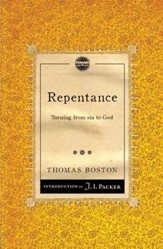Quotes about Repentance-Contrition
Repentance is the tear of love, dropping from the eye of faith, when it fixes on Christ crucified.
Other things may be the worse for breaking, yet a heart is never at the best till it be broken.
A Puritan Golden Treasury, compiled by I.D.E. Thomas, by permission of Banner of Truth, Carlisle, PA. 2000, p. 238.
He that has not so much sense of his faults as unfeignedly to lament them, will hardly have so much more as to move him to reform them. The sorrow of repentance may exist without a change of heart and life; because a passion may be more easily wrought, than a true conversion. But the change cannot take place without some good measure of the sorrow.
An evidence that our will has been broken is that we begin to thank God for that which once seemed so bitter, knowing that His will is good and that, in His time and in His way, He is able to make the most bitter waters sweet.
Again and again, God’s Word reveals that He is not as concerned about the depth or extent of the sin we commit as He is about our attitude and response when we are confronted with our sin.
Many mourn for their sins that do not truly repent of them, weep bitterly for them, and yet continue in love and league with them.
Until God is your chief concern — until sinning against Him is what makes your heart break — you will never turn the corner.
Finally Free: Fighting for Purity with the Power of Grace, Zondervan, www.zondervan.com, 2013, p. 43.
The grief of repentance is never loss in any way; not to experience this grief, that is loss indeed.
When a sinner is truly repentant and comes to God in a broken and contrite spirit and asks for forgiveness and God forgives and transforms, it is the working of the Holy Spirit.
Is There Ever a Just Reason for It? The sermon originally appeared (www.gty.org/library/sermons-library/42-44/true-repentance-gods-highway-to-the-heart-part-4) at www.gty.org. © 1969-2008. Grace to You. All rights reserved. Used by Permission.
The sorrow of true repentance is…sorrow for offense against a holy God, not simply regret over the personal consequences of our sin. Sorrow over being found out or over suffering hardship or discipline because of our sin is not godly sorrow, and has nothing to do with repentance. That sort of sorrow is but selfish regret, concern for self rather than for God. It merely adds to the original sin.
Godly sorrow causeth grief for sin, because it is sin. It makes any man in whom it is to be of this disposition and mind, that if there were no conscience to accuse, no devil to terrify, no Judge to arraign and condemn, no hell to torment, yet he would be humbled and brought on his knees for his sins, because he hath offended a loving, merciful, and longsuffering God.
Let my heart be broken with the things that break God’s heart.
Genuine evangelical contrition – as opposed to legalistic, fearful sadness simply owing to threats – is a sorrow for not having holiness. But now you have to be careful here. It is possible to weep over not having holiness not because you love God and want to enjoy all that He is for you in Christ but because you fear the punishment that comes for not having holiness. Many a criminal will weep when his sentence is read, not because he has come to love righteousness, but because his freedom to do more unrighteousness is being taken away. That kind of weeping is not true evangelical repentance. And it does not lead to radical Christian obedience.
I think of Peter after He denied the Lord. The Bible says, “He went out and wept bitterly” (Lk. 22:62). Psalm 38:18, “For I confess my iniquity; I am full of anxiety because of my sin.” Jeremiah 31:18, “I have surely heard Ephraim grieving, ‘You have chastised me, and I was chastised, like an untrained calf; bring me back that I may be restored, for You are the LORD my God.’” In the Beatitudes our Lord said, “Blessed are those who mourn, for they shall be comforted” (Mt. 5:4). In 2 Corinthians 7, Paul spoke of a “godly sorrow.” In the depths of your relationship with God have you ever experienced this? When we sin against God we should experience our most intense grief. In verse 3 of Psalm 6, David speaks of His soul being “greatly dismayed.”
When have you most recently felt the crushing pain of a burdened heart, darkened soul or guilty conscience solely because of your sin against God? Does sin hurt you as much as it hurts God? Does it make you sick, grieved or disappointed? Does it weigh on you prompting repentance and calling to God for restoration? Do you ever feel that your sin has divided you from a rich relationship with God and the feeling is one of emptiness, despair and regret?
Remember that the man who truly repents is never satisfied with his own repentance. We can no more repent perfectly than we can live perfectly. However pure our tears, there will always be some dirt in them; there will be something to be repented of even in our best repentance. But listen! To repent is to change your mind about sin, and Christ, and all the great things of God. There is sorrow implied in this; but the main point is the turning of the heart from sin to Christ. If there be this turning, you have the essence of true repentance, even though no alarm and no despair should ever cast their shadow upon your mind.
A heart crushed is a fragrant heart. Men contemn those who are contemptible in their own eyes, but the Lord sees not as man sees. He despises what men esteem, and values that which they despise. Never yet has God spurned a lowly, weeping penitent, and never will he while God is love, and while Jesus is called the man who receives sinners. Bulls and rams He desires not, but contrite hearts He seeks after.
Remorse, regret, sorrow, and the pain provoked by sin will only increase and intensify the longer we are Christians. Maturity in the faith does not lead to less sorrow over sin, but more. The pain does not diminish; it deepens.
The truth is that there are such things as Christian tears, and too few of us ever weep them.
Godly sorrow and worldly sorrow. The first one leads to life, but the latter shoves us into a spiritual grave. Worldly sorrow only bemoans getting caught or weeps for what was lost. It never grieves for the wrong committed. Godly sorrow produces different results. When we experience godly sorrow, we are deeply grieved for the wrong we committed. We desire to ask forgiveness, to repair the damage, to make reparation for the harm done; not merely to protect ourselves from pain or regain what we didn’t want to give up. In a word, we repent.
Getting Past Guilt: Overcoming Barriers to Feeling Forgiven. See more at: http://www.insight.org/resources/articles/encouragement-healing/getting-past-guilt.html?referrer=https://www.google.com/#sthash.Pk5C35Qn.dpuf.
He grieves truly that weeps without a witness.
A Puritan Golden Treasury, compiled by I.D.E. Thomas, by permission of Banner of Truth, Carlisle, PA. 2000, p. 238.
I would rather feel contrition than know how to define it.
There is a radical distinction between natural regret and God-given repentance. The flesh can feel remorse, acknowledge its evil deeds, and be ashamed of itself. However, this sort of disgust with past actions can be quickly shrugged off, and the individual can soon go back to his old wicked ways. None of the marks of true repentance described in 2 Corinthians 7:11 are found in his behavior. Out of a list of 10 men in the Bible who said, “I have sinned,” we believe only five actually repented. They were David (2 Sam. 12:13), Nehemiah (Neh. 1:6), Job (Job 42:5,6), Micah (Micah 7:9), and the prodigal son (Luke 15:18).
It argues more grace to grieve for the sins of others than for our own. We may grieve for our own sins out of fear of hell, but to grieve for the sins of others is from a principle of love to God.
A Puritan Golden Treasury, compiled by I.D.E. Thomas, by permission of Banner of Truth, Carlisle, PA. 2000, p. 51.




















